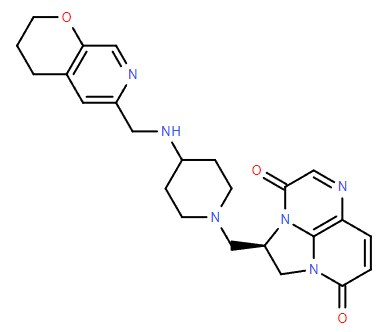Chemical Name: Gepotidacin
CAS No.:
1075236-89-3

A ground-breaking discovery in the ever-evolving field of antibiotic research is the new agent gepotidacin, which has the potential to completely alter the way that bacterial infections are treated. This innovative compound, known by its chemical identifier 1075236-89-3 and research moniker GSK2140944, was recently highlighted for its encouraging outcomes in critical phase III trials, EAGLE-2 and EAGLE-3, as announced by GSK on April 15, 2023.
In the crowded field of antibacterial drugs, gepotidacin stands out due to its distinct method of action. This medicine takes a novel approach to bacterial DNA replication by blocking two essential enzymes at the same time: DNA gyrase and topoisomerase IV. The dual-action mechanism described here is a revolutionary concept, as it necessitates mutations in both enzymes in order for bacteria to acquire resistance. This substantially diminishes the probability of such incidents transpiring and presents an innovative approach to combating antibiotic resistance.
In the phase III EAGLE-2 and EAGLE-3 studies, the clinical effectiveness of gepotidacin was tested against the standard treatment for urinary tract infections (UTIs), nitrofurantoin. The results were promising: gepotidacin had a 50.6% success rate in EAGLE-2 and an even higher 58.5% in EAGLE-3, outperforming nitrofurantoin in both cases. In addition, the trials underscored the effectiveness and potential of Gepotidacin as a solitary option, as a significant majority (94%) of patients who were treated with it did not require supplementary antibiotics for urinary tract infections (UTIs).
In addition to these honors, gepotidacin performed exceptionally well in the EAGLE-1 phase III trial, which was revealed by GSK on February 26, 2024 and focused on the treatment of gonorrhea. Gepotidacin fulfilled its primary effectiveness endpoint and demonstrated non-inferiority to the current regimen of intramuscular ceftriaxone combination with oral azithromycin. In light of the alarming increase in antibiotic-resistant gonorrhea cases around the globe, this is especially noteworthy.
Gepotidacin is a potentially useful treatment for patients, as evidenced by its safety and tolerability, which are in line with previous study phases. The broad adoption and application of novel antibiotics depend on striking this delicate balance between safety and efficacy.
In antibiotic therapy, gepotidacin is leading the way into a new age. Its innovative method to bacterial suppression, combined with its efficacy in clinical trials, position it as a strong weapon against infections, particularly those that have developed resistance to current treatments. The advancement and implementation of novel strategies, such as Gepotidacin, are crucial in order to ensure that effective treatments will continue to be accessible in the face of the global antibiotic resistance crisis.
